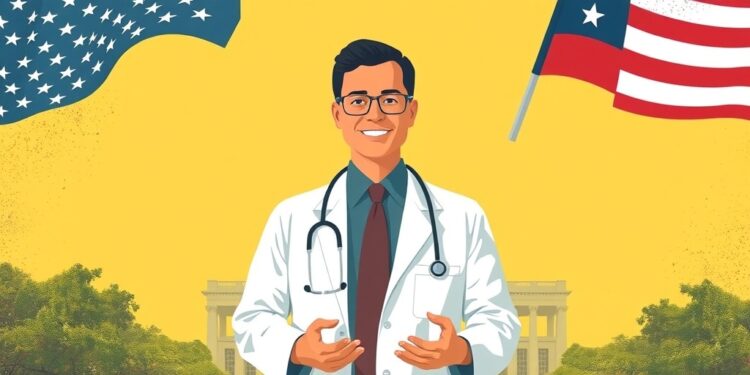In recent years, the intersection of politics and health has become more pronounced, revealing troubling trends in the way individuals trust medical professionals. Research conducted by political scientist Neil O’Brian at the University of Oregon offers a compelling examination of how partisanship influences trust in personal doctors. The study suggests that Democrats display higher levels of trust in their doctors compared to Republicans, illustrating an alarming trajectory for public health in the United States.
The COVID-19 pandemic serves as a significant backdrop for this divergence in trust. Prior to the pandemic, individuals across the political spectrum generally exhibited bipartisan confidence in their healthcare providers. However, the advent of the pandemic polarized opinions on public health measures and instigated an ideological divide. As O’Brian notes, this polarization has rippled into the doctor-patient relationship, leading to a discernible shift in how Republicans and Democrats perceive their personal physicians. With the pandemic acting as a catalyst, the trust that patients place in their doctors is now increasingly contingent upon political identity.
Understanding the implications of this shift is crucial, especially in light of declining life expectancy rates in the U.S. The research identifies a correlation between political affiliation and health outcomes, highlighting a growing gap in death rates between Republican and Democratic-leaning counties. In essence, this divide may exacerbate preexisting health disparities, further challenging efforts to address chronic illnesses through universally accepted medical standards.
The study underscores a worrisome trend: distrust in medical professionals can impede efforts to resolve health issues. When patients align their healthcare decisions with their political beliefs, it jeopardizes their adherence to vital medical guidance. This phenomenon takes on added significance in an environment where the importance of preventive care—ranging from regular screenings to vaccinations—is critical for public health. The results of the study illuminate an urgent need for discourse that transcends political divides, fostering a renewed collective trust in the medical profession.
Central to O’Brian’s investigation is the methodology employed to analyze these trust dynamics. The researchers utilized a series of experiments juxtaposing reactions to contextually framed headlines about prominent healthcare figures, such as Dr. Anthony Fauci. Participants exposed to politically charged narratives exhibited heightened polarization; Democrats reported increased trust in their doctors, while Republicans showed a corresponding decrease. This illustrates how media framing can influence personal beliefs, thereby affecting health-caring behaviors.
In delving deeper, the research engages with the critical role that perceived political affiliation of healthcare providers plays in shaping patient trust. Two fabricated dermatology profiles were used in experiments, with study participants consistently indicating a preference for doctors whose political beliefs aligned with their own. This preference crosses partisan lines, suggesting that both Democrats and Republicans gravitate toward clinicians who reflect their own political views. This inclination toward political alignment in healthcare relationships poses considerable risks, especially in an increasingly polarized society.
Additionally, by analyzing behavior in two distinct online healthcare directories, the study revealed that Republican respondents were more inclined to seek medical assistance from platforms that aligned with their conservative views. This behavior highlights the extent to which partisanship now influences healthcare choices, ultimately framing the doctor-patient relationship as one intertwined with political ideology rather than solely grounded in clinical expertise.
O’Brian notes that this growing disparity in trust is rooted in broader societal shifts that have continuously reshaped public opinions on various institutions. Historically, medical institutions were viewed through a largely nonpartisan lens. However, as divisions sharpened in the realm of national politics, the medical profession has not remained exempt from scrutiny and skepticism. The factors driving this mistrust are complex and multi-faceted, demanding comprehensive examination and understanding.
As political lines continue to be drawn more firmly, O’Brian aims to delve further into the underlying mechanics of trust between patients and their healthcare professionals. A future research agenda will likely involve analyzing the implications of this trust gap on health outcomes, exploring if disparities exist between different political groups regarding adherence to medical advice. Unraveling these dynamics will be essential in crafting health policy that is inclusive and effective for all citizens, regardless of political affiliation.
Certainly, as this examination unfolds, it holds promise for informing best practices within the medical community. Increased awareness of the partisan dynamics affecting trust in healthcare can lead to more dedicated strategies to bridge divides among patients. Fostering an environment where patients feel safe and unencumbered by political biases when engaging with their health—a goal that should be paramount in contemporary medicine—will ultimately enhance health outcomes.
As the findings gain traction within the academic community and beyond, they illuminate a pressing need for healthcare providers to adopt an empathetic approach in their practice. By understanding the partisan sentiments of their patients, healthcare professionals can cultivate relationships founded on trust and understanding, thus facilitating improved health outcomes for individuals across the political spectrum. Transformation in public health may require not only a shift in healthcare practices but also a cultural reassessment of our approach to medical trust and the intersection of politics and health.
This research serves as a clarion call for the medical community to address the widening schisms brought on by partisanship. As society grapples with the complex tapestry of politics and health, the insights derived from O’Brian’s study poignantly highlight the urgency of fostering trust—an essential ingredient for not only individual well-being but also for the collective health of a nation. The time is ripe for collaboration and understanding, with the goal of rekindling trust in the medical profession that has been eroded by political division.
Subject of Research: Partisanship and trust in personal doctors
Article Title: Partisanship and Trust in Personal Doctors: Causes and Consequences
News Publication Date: 7-Mar-2025
Web References: British Journal of Political Science
References: Neil O’Brian, Thomas Bradley Kent, University of Oregon
Image Credits: University of Oregon
Keywords: trust, partisanship, personal doctors, healthcare, public health, political science, COVID-19, health outcomes.




